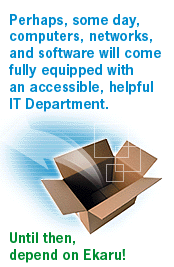












In the News
Home offices need disaster-proofing
By Ann Westerheim / Special to the Beacon
Thursday, July 22, 2004
Care and maintenance of the technology in your home office should always be a priority. Whether your home computer is the permanent hub for a home-based business, a focal point for household accounts, or a link to your office computer when you can't get there, your home office technology equipment needs your attention. Simple measures, such as backing up data, downloading the latest anti-virus update, and a few other, easy procedures can make the difference between a simple-to-remedy glitch and a technology disaster.
Back up your data
Even in your home office, you should get into the practice of running proper data back-ups. Many people don't regard loss of data as important because they believe that they can re-enter it quickly. This simply isn't true. The amount of information one stores over time can be staggering.
Periodically backing up your data will protect against system crashes, loss or theft of systems, and user mistakes. There are several great options available: Read/write CDs - These are easy and inexpensive, although they have limited storage capacity. Tape Drives - These provide more storage but can get to be expensive. Network Access Storage - These devices are relatively new and very convenient. On-line storage.
The best way to handle your individual back-up needs is to look at the size of your data files and match it to the solution that best fits your needs. Select a solution that you'll actually use. If you have a slow Internet connection, you'll probably be frustrated by on-line storage. If you have a lot of data on your system, you'll have to use several CDs and may skip backing-up some important files.
Some applications, such as Microsoft Office XP, have built in back-up software. With it, all files can be backed up with the press of a button, without having to copy files individually.
Anti-virus protection
Getting a computer virus is frustrating. Although virus removal tools are available free of charge on the Web, many are challenging and time-consuming to use. In addition, if the virus kills your system, getting on the Internet to obtain the removal tool won't be possible.
The good news is that viruses are usually avoidable if you take these steps:
Run anti-virus software on all your systems.
Run "live updates" on a regular basis, at least every week, to protect against new viruses. The anti-virus software available in stores is already out-of-date the day it's installed. Scan all incoming and outgoing e-mails. Run full system scans on a weekly basis. If your home network runs several computers, and a virus enters the system, each computer will need to be disconnected from the network, and each one will need to be cleaned. Check your anti-virus "system status" periodically.
Wireless security
Wireless networks are great. Everyone in your house can be connected to the network and share an Internet connection without the costly expense of hiring an electrician to install wiring. And you can enjoy sitting on the back porch while working on your computer. But if your wireless network isn't properly configured, anyone can access your network!
To avoid this, turn on WEP (Wired Equivalent Privacy) encryption. Change the default password (A lot of people don't know this needs to be done). And turn off the SSID (Service Set Identifier).
By following a few simple steps you can protect your computers and your network. Spend more time enjoying technology and less time fighting it.
Ann Westerheim, Ph.D., is president of EKARU, LLC based in Westford.

